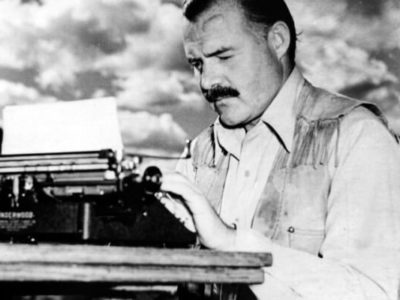So, you graduated high school and are convinced you’re going to write the next great American novel as a result of your 4 on the AP English Exam that you “didn’t really even try on.” But don’t be surprised if your professor etches so many red marks on your first college essay that you confuse it for a three-year-old’s art project done solely in red crayon. Fret not my young Steinbeck; the bar has just been raised. Think you’re up for the challenge?
10. Don’t Procrastinate

Five page paper due tomorrow? Hope you’ve already started. You may have been able to bang out a five pager in high school and sneak away with an A-, but not in college. Professors can tell if your submitted essay is really a rough first draft, most evident by your 17 typos. Start the paper early and go through several revisions in order to avoid the fatal “See me” comment.
9. Forget the Five-Paragraph Essay

Seriously. Forget it. Never write five paragraphs again or follow anything close to the secret paper formula your SAT tutor gave you. Release the shackles of form and write freely. Obviously maintain a certain coherent structure, but make it your own. College professors aren’t interested in reading 60 essays written exactly the same way, so give them a little creativity to spice up their grading process.
8. Remember less is More

Leave your shovel in the shed and let someone else scoop up the BS. When a professor says, “No more than x pages,” they mean, “If you write one word over, I will fail you.” Follow the professor’s instructions and try to write on the bottom half of the word limit. The more concise your writing is, the better. In fact, try to cut at least 100 words of fluff from your final draft of any writing you submit.
7. Avoid “-ing” Verbs”

In formal writing, try to limit all verbs ending in ing, AKA present participles. Nine times out of 10, you can rephrase the sentence to fit an active verb with an “s” ending. “Depend on a dictionary rather than spell check,” said Susan Monsky, a creative writing professor at Boston College. Spell check can’t create active verbs–the life your sentences need to keep your professor awake during the 43rd paper he or she has read in the last hour.
6. Utilize the Resources Around You

Most colleges have tutoring centers chock full of writers who want to meet with you, talk about your work and tear each sentence a new one with an encouraging attitude. If you have a hard time editing your own writing, visit the tutoring center to find a nice hipster English major with an internship at the New Yorker to promptly humble you.
5. Keep a Journal

Good writing takes practice. If you keep a journal to jot down your thoughts every day with a nice, bland coffee from your dining hall in hand, you’ll see your writing begin to improve almost immediately. You don’t have to write a Shakespearean sonnet to express your ideas, just simply a few lines describing your day straight from the heart. If you learn to express yourself in your journal, portraying your ideas in formal writing will be a breeze.
4. Read Your Pieces Out Loud

I know you’ve heard this one before, but reading your essays or stories aloud can really highlight gaps or voice issues with your writing. “Be your own audience: Read your work aloud to yourself from a printed copy,” Monsky said. Your writing should flow like a conversation with your BFF, not like one with you mother after she sees your messy dorm room on Parent’s Weekend.
3. Put the Thesaurus Away

Professors aren’t interested in reading your suave reasoning through disjointed verbs. See what I did there? Simple, clear writing is more often than not the best method of writing. The most successful writers can express their ideas in the most concise way possible without using ostentatious vocabulary.
2. Get Personal

People never think to “write about what they know” in formal writing, but you can and should. While you may not want to talk about the time you fell off your bicycle in an analytical essay on Metamorphoses, you can still write about how the work affects you. If you found that the piece bored you to tears, write why. Leave the fake stuff behind and get in touch with yourself to snag that A.
1. Read Good Writing

Reading good writing is the easiest way to improve your own writing. The best works of fiction, prose or journalism are readily available to you at all times. So, why not take advantage? Learn the style and voice of Jane Austen, and soon you’ll write the next Pride and Prejudice.



















